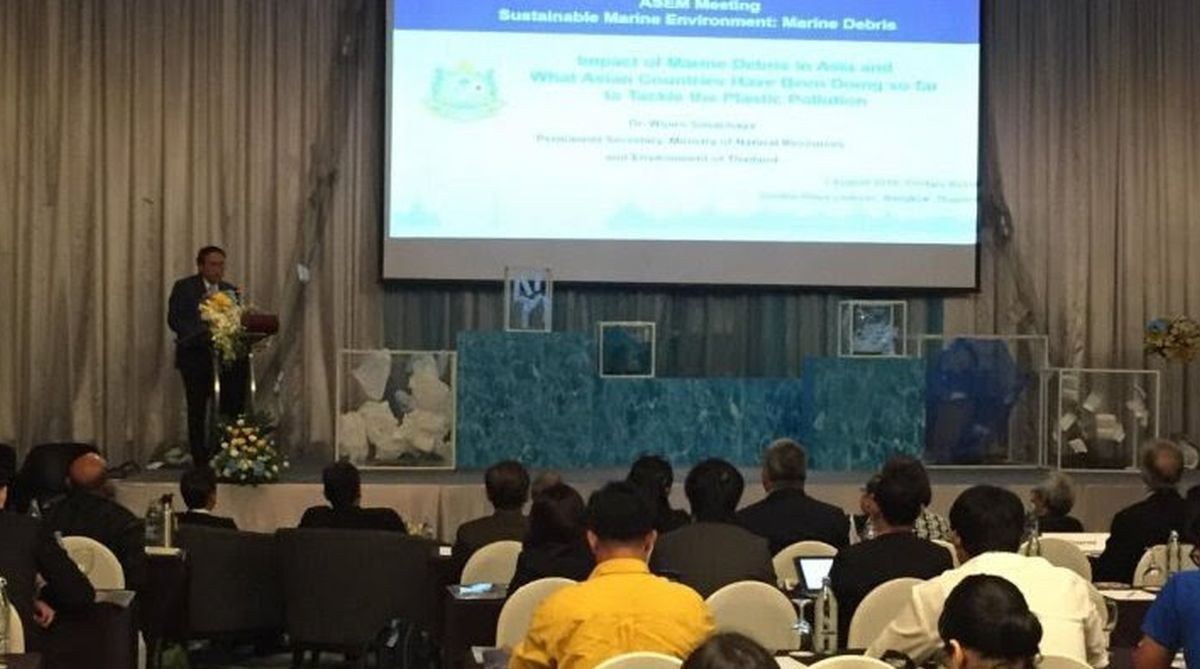Representatives and specialists from official agencies, international organisations, business, and the public sectors of 51 member countries of the Asia-Europe Meeting (ASEM) framework on Friday shared their experience and discussed actions that could be taken to reduce problems caused by plastic pollution in the sea.
The meeting, titled Sustainable Marine Environment: Marine Debris, on Friday agreed that urgent action was needed to address what they saw as a massive and serious problem.
Advertisement
At stake, they agreed, were not only the survival of many marine species and the sea’s bountiful natural resources, but also the human needs for food security, public health and the livelihoods of people around the world.
Marine debris is now one of the major threats to the planet’s environment and all of humanity, said deputy regional director of UN Environment Asia Pacific Office, Isabelle Louis. The only hope to fight plastic-caused problems in the oceans lies in partnerships, innovative solutions and changes in lifestyles, she said.
“While much attention is, appropriately, given to removal and clean-ups, the lasting solutions to the problem is mainly upstream,” Louis said.
“No single action is sufficient to effectively reduce plastic waste. We need a range of responses, change across the board and collective actions by all to achieve this goal.”
Asean’s Vongthep Arthakaivalvatee noted the transboundary nature of marine plastic pollution. Marine debris is not confined to a single source and, floating at sea, knows no boundaries, said the Deputy Secretary-General of Asean for Asean Socio-Cultural Community. Given this, multi-stakeholder collaboration at the regional and even global level is required to solve the problem, he said.
“From land to sea, from policymakers to industry, from the private sector to consumers, everyone needs to step up and be a part of the solution that can address the problem holistically,” Vongthep said.
The UN’s Louis added that the collaboration of all stakeholders will be required for campaigns to raise social awareness about plastic problems, as well as to adjust public consumption behaviours and change the business sector’s production patterns and business models. Collaboration is also needed to encourage innovative product and material development, and to find better and more efficient recycling and waste management solutions.
“This ASEM meeting provides an important platform that enables cross-sectoral stakeholders to actively collaborate at local, national and regional levels on the same mission to tackle the critical issues of marine debris, including plastic waste,” she said.
“An exchange of the best practices from both Asia and Europe is vital to inform and shape innovative solutions to reduce waste from their point of origin, and to prevent garbage from entering the sea.”
According to recent studies, up to 12.7 million tonnes of mismanaged plastic waste are washed into the sea every year, causing environmental degradations, damaging marine ecosystems, and harming the livelihoods of people who depend on marine natural resources.
Representatives and specialists from official agencies, international organisations, business, and the public sectors of 51 member countries of the Asia-Europe Meeting (ASEM) framework on Friday shared their experience and discussed actions that could be taken to reduce problems caused by plastic pollution in the sea.
The meeting, titled Sustainable Marine Environment: Marine Debris, on Friday agreed that urgent action was needed to address what they saw as a massive and serious problem.
At stake, they agreed, were not only the survival of many marine species and the sea’s bountiful natural resources, but also the human needs for food security, public health and the livelihoods of people around the world.
Marine debris is now one of the major threats to the planet’s environment and all of humanity, said deputy regional director of UN Environment Asia Pacific Office, Isabelle Louis. The only hope to fight plastic-caused problems in the oceans lies in partnerships, innovative solutions and changes in lifestyles, she said.
“While much attention is, appropriately, given to removal and clean-ups, the lasting solutions to the problem is mainly upstream,” Louis said.
“No single action is sufficient to effectively reduce plastic waste. We need a range of responses, change across the board and collective actions by all to achieve this goal.”
Asean’s Vongthep Arthakaivalvatee noted the transboundary nature of marine plastic pollution. Marine debris is not confined to a single source and, floating at sea, knows no boundaries, said the Deputy Secretary-General of Asean for Asean Socio-Cultural Community. Given this, multi-stakeholder collaboration at the regional and even global level is required to solve the problem, he said.
“From land to sea, from policymakers to industry, from the private sector to consumers, everyone needs to step up and be a part of the solution that can address the problem holistically,” Vongthep said.
The UN’s Louis added that the collaboration of all stakeholders will be required for campaigns to raise social awareness about plastic problems, as well as to adjust public consumption behaviours and change the business sector’s production patterns and business models. Collaboration is also needed to encourage innovative product and material development, and to find better and more efficient recycling and waste management solutions.
“This ASEM meeting provides an important platform that enables cross-sectoral stakeholders to actively collaborate at local, national and regional levels on the same mission to tackle the critical issues of marine debris, including plastic waste,” she said.
“An exchange of the best practices from both Asia and Europe is vital to inform and shape innovative solutions to reduce waste from their point of origin, and to prevent garbage from entering the sea.”
According to recent studies, up to 12.7 million tonnes of mismanaged plastic waste are washed into the sea every year, causing environmental degradations, damaging marine ecosystems, and harming the livelihoods of people who depend on marine natural resources.
(ANN/The Nation)











